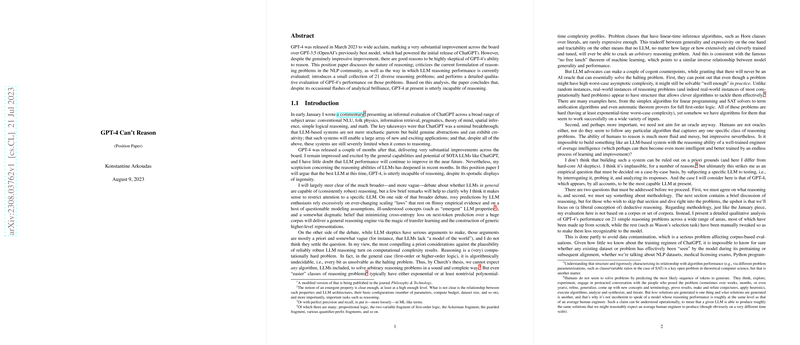A Critical Analysis of "GPT-4 Can't Reason"
The paper "GPT-4 Can't Reason" by Konstantine Arkoudas presents a thorough analysis of GPT-4's reasoning capabilities, critically examining the limitations and challenges faced by the most advanced LLM developed by OpenAI as of its time. The analysis spans a range of reasoning tasks, highlighting fundamental problems within GPT-4. The paper takes a methodical approach, defining reasoning, laying out methodologies, and analyzing the model's performance on various tasks.
Core Assertions and Methodology
Arkoudas begins by setting the stage with a discussion on what constitutes reasoning, emphasizing its importance in various applications. Reasoning is identified primarily as the ability to draw and justify conclusions from given premises. The paper focuses on dissective reasoning, specifically deductive reasoning, while also acknowledging inductive and abductive reasoning, albeit the latter not being the focal point.
The methodology is qualitative rather than strictly quantitative. Arkoudas presents a set of 21 diverse reasoning problems and analyzes GPT-4's performance on these tasks. This approach, while making broad numerical evaluations difficult, allows for a deep dive into the nuances of the model’s performance.
Summary of Key Findings
Simple Arithmetic and Counting
GPT-4 exhibits significant inconsistency in performing basic arithmetic and counting. Arithmetic errors were prominent when the model was prompted to multiply or add numbers, even when it generated the numbers itself. A notable instance showed GPT-4 generating incorrect multiplication results consistently. Given the reliance on persistent memory and correct token predictions for computation, these errors raise doubts about its fundamental arithmetic reasoning.
Logical Reasoning
The exploration of GPT-4’s performance on elementary logic exercises reveals stark shortcomings. For example, the model fails to correctly leverage modus tollens, a basic inference rule. The analysis shows GPT-4 producing countermodels that inherently violate given premises. Similar errors appear in other logical reasoning scenarios, where GPT-4 demonstrates an inability to produce internally consistent derivations.
Commonsense Reasoning and Spatial Reasoning
The model also struggles with commonsense reasoning and spatial tasks. When asked to deduce the implications of simple real-world scenarios, GPT-4 provided incorrect or nonsensical answers. An example involved determining if someone was alive based on given time references and led to ambiguous and contradictory outputs. In spatial reasoning tasks, the model failed to maintain a consistent reference frame and contradicted straightforward spatial relationships, such as left from right.
Mathematical and Temporal Reasoning
The examination of GPT-4 on mathematical proofs and temporal reasoning problems further underscores its limitations. GPT-4 produced multiple incorrect logical steps and struggled with the consistency required for proof validation. In temporal reasoning tasks, the paper demonstrates the model’s inability to maintain logical coherence across a sequence of temporal events, leading to erroneous conclusions.
Implications and Future Directions
Arkoudas asserts that the severe limitations of GPT-4's reasoning capabilities hold significant implications for its application in domains requiring logical rigor, such as software engineering, scientific research, and any intricate planning tasks. Given the propensity for significant errors, relying on GPT-4 beyond trivial tasks could lead to unreliable and potentially harmful outcomes.
Need for Rigorous Proof Checking
With the insights presented, the paper suggests future development could benefit from integrating rigorous proof-checking mechanisms, which might notice inconsistencies and flag logical errors. However, doing so within the confines of current LLM architectures is non-trivial, pointing to a need for hybrid models that can leverage symbolic reasoning techniques alongside language generation capabilities.
Cautions Against Over-Optimistic Projections
The paper warns against over-optimistic projections about the near-term evolution and applicability of LLMs for complex reasoning tasks. The pitfalls outlined suggest that significant advancements are required before systems like GPT-4 can be deployed reliably in mission-critical environments.
Conclusion
In summary, "GPT-4 Can't Reason" presents a meticulous paper that highlights fundamental deficiencies in GPT-4’s reasoning abilities. Through rigorous problem formulation and qualitative analysis, Arkoudas provides compelling evidence that challenges current perspectives on the model's capacity for reasoning. The paper’s findings underscore the need for caution in applying LLMs to domains that require high levels of computational accuracy and logical rigor, advocating for continued research into hybrid approaches and more sophisticated reasoning algorithms.
